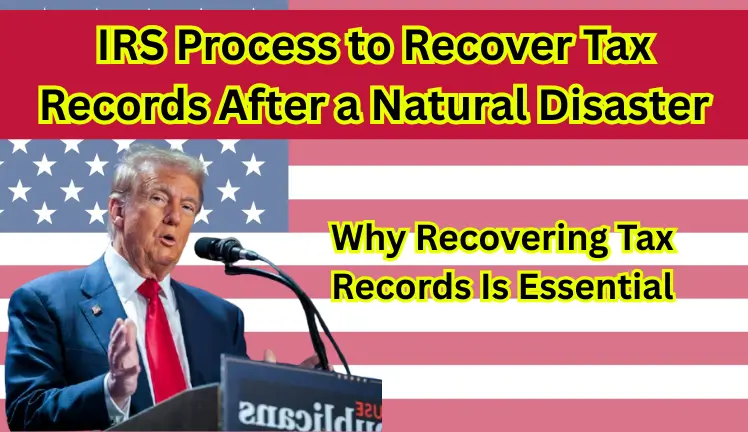Recover Tax Records: Natural disasters like hurricanes, floods, wildfires, and storms can destroy more than just homes — they can wipe out essential financial records. Among the most important are tax documents, which are required to claim losses, apply for federal disaster assistance, and file accurate tax returns.

The Internal Revenue Service (IRS) provides a clear recovery process to help individuals and businesses reconstruct lost tax records following a disaster. This guide explains the full process in a simple, organized way.
Why Recovering Tax Records Is Essential
Recovering your tax documents isn’t optional — it’s critical for:
- Claiming disaster-related deductions for losses and damages
- Accessing federal aid through FEMA or SBA programs
- Avoiding problems during future tax filings or audits
Without accurate tax records, it can be harder to prove income, property ownership, and business losses.
IRS Process to Recover Tax Records After a Disaster
Step 1: Get Your IRS Tax Transcripts
Use the Get Transcript tool on the IRS website. It allows you to quickly access your past tax data.
If you prefer offline:
- Call the IRS at 800-908-9946
- Or file Form 4506-T to request your transcript by mail
Step 2: Contact Banks and Financial Institutions
Reach out to:
- Banks for account summaries and transaction history
- Credit card companies for proof of expenses
- Mortgage lenders for home loan records and insurance-related documents
Step 3: Request Free Replacement Tax Documents
If your home or business is in a federally declared disaster area, the IRS will waive fees for document replacement.
- File Form 4506
- Mention the FEMA disaster declaration number
Also, check the IRS Disaster Relief page — they often offer extended filing deadlines for affected taxpayers.
Step 4: Work With a Tax Professional
Tax experts can:
- Help you reconstruct financial records
- Guide you in claiming disaster-related tax relief
- Ensure your insurance and IRS paperwork is accurate and complete
Step 5: Refer to IRS Publication 2194
This IRS guide offers specific instructions for both individuals and businesses.
Download it from IRS.gov and follow steps for:
- Record recovery
- Loss deductions
- Available tax relief programs
Step 6: Explore Federal Disaster Assistance
Visit DisasterAssistance.gov for:
- Housing and relocation aid
- Medical and food programs
- SBA business recovery loans
Deductible Disaster-Related Expenses
The IRS allows certain out-of-pocket disaster costs to be deducted from your taxes:
- Property repairs and damage-related costs
- Temporary housing during evacuation
- Evacuation travel and medical expenses
Make sure to keep receipts and documentation for all disaster-related expenses.
Tips to Protect Your Records for the Future
- Digitize important documents and store on the cloud or secure USB
- Use fireproof, waterproof storage for physical copies
- Maintain a simple checklist of essential records to take during emergencies
Frequently Asked Questions
Q1. How can I get a tax transcript if I lost all paperwork?
Use the IRS Get Transcript tool online or call 800-908-9946. You can also mail Form 4506-T to request it.
Q2. Are property repairs tax deductible after a disaster?
Yes, if the loss is from a federally declared disaster, and not fully reimbursed by insurance.
Q3. Does the IRS charge to replace lost tax returns after a flood or fire?
No. If your area is federally declared as a disaster zone, the replacement is free.
Q4. Where do I find help beyond the IRS?
Visit DisasterAssistance.gov or contact FEMA or SBA for other recovery programs.
Q5. What is IRS Publication 2194?
It’s the IRS’s official disaster resource guide offering instructions for recovering records and claiming eligible relief.
As a finance news writer at sirfal.com, I specialize in breaking down complex economic trends, market updates, and investment strategies into clear, actionable insights. My mission is to empower readers with the knowledge needed to make informed financial decisions. Thank you for engaging with my articles; I hope they add value to your financial journey.
Would you be thinking about exchanging links?